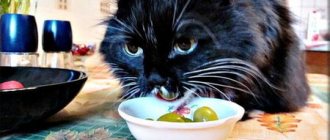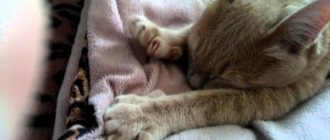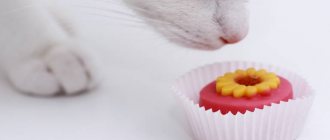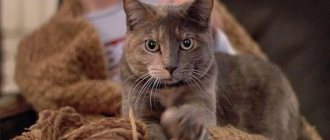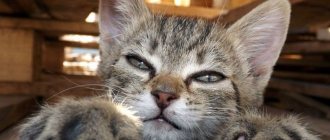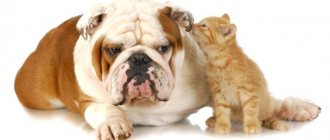All people are very familiar with the plant valerian; they take it in drops or tablets in order to calm down. However, cats behave completely differently after valerian. In our article we will try to figure out why cats love valerian and how it affects their mustachioed pets.
Why Valerian Attracts Cats
Seeing how the behavior of cats changes after consuming this plant, zoologists decided to figure out why cats love valerian, and made several conclusions:
- They like it because of the similarity of the smell of the plant and the smell of hormones present in cat urine. In animals, the level of hormones in the blood increases, up to euphoria.
- The root of the plant contains the substance actinidin, which is addictive in the cat family, that is, it acts like a drug and the cat cannot tear himself away from valerian.
- There is also an opinion that long ago, when cats lived in the wild, they used this plant as a painkiller.
Why cats love valerian
Zoologists have been studying the love of cats for valerian: anyone who has ever seen how this plant affects purring cats will definitely want to know where this obsession comes from. So scientists have studied this issue. It turned out that there is a similarity between the aroma of weed and the pheromones of an adult cat. Cats, smelling such a smell, come under the influence of special substances, as a result we see the manifestation of an altered hormonal and emotional state of animals. Since the central unequal system is affected, cats experience disturbances in the perception of reality. For an outside observer, this looks like inappropriate behavior of a cat, but for the animal it is a real drug. And since the drug causes intoxication, meowing creatures like this effect: you just need to drop a few drops of valerian onto any object, and the cat will immediately begin to show super-persistent attention to the thing.
There is also a version that valerian root is a feline aphrodisiac - a pronounced reaction to it appears in cats after puberty and during estrus.
How does the plant work?
What does valerian mean for cats, can it be given to an animal? There is no clear answer to this question. Let's look at the pros and cons of this influence.
Minuses:
- Valerian for cats is a narcotic drug. At first they experience excitement, then relaxation occurs, right up to a narcotic sleep.
- Valerian is a hallucinogenic drug for cats.
- Valerian and cats are incompatible things, but the animal thinks differently. If you give it to your pet, he will get used to this drug and do everything to try it again and again. If an animal is given a large amount of water to drink, a coma may occur, which manifests itself as follows: the cat falls to the floor, it develops convulsions, foam, and its eyes roll back.
- Sometimes death may occur due to heart attack, stroke or respiratory arrest.
- Sometimes, consuming this plant may cause your pet to experience panic and uncontrollable behavior that will last for several days.
Valerian has no effect on kittens less than six months old.
Pros:
- You can give the plant to relieve pain caused by spasms; it relieves gastrointestinal spasms well.
- For diseases of the thyroid gland, it can be given as an infusion.
- Used for nervous and cardiovascular diseases.
- Sometimes, for eye diseases, rinsing is done with an infusion of valerian root.
Valerian - what is it?
It is no secret that we call valerian a tincture made from the medicinal herb valerian (more precisely, from its rhizomes). And it is used by people to calm their nerves and slow down their heartbeat a little. But let's start with the fact that the tincture is always alcohol-based (in this case, 70 percent ethyl).
And alcohol is very dangerous for an animal: a drop for a cat is like a glass of alcohol, not vodka, but pure 70% alcohol for an adult man. The nervous system suffers greatly, the processes of impulse conduction are disrupted.
The rhizomes themselves contain alkaloids and essential oils. It is alkaloids that cause addiction in an animal, like a narcotic. Although it is interesting that if the cat gets to the real root, not preserved in alcohol, but dug out of the ground, then there will be no harm to the animal from eating it.
We know that pets themselves are treated with herbs, so fresh valerian roots help purrs with a sore stomach.
How to make an infusion to treat certain diseases
Valerian and cats can be compatible, if, of course, the herb was prescribed to your pet by a veterinarian. For medicinal properties, it is used when the root of the plant is previously crushed and infused in boiling water (5 grams of the root is infused in a glass of boiling water for 2 hours in a water bath).
You can give the infusion strictly in the dosages prescribed by the veterinarian, otherwise an overdose may occur.
Overdose symptoms
Characteristic features of the negative effects of the drug are visible from external signs of behavior or changes in habits:
- Toxic damage. Profuse salivation begins, foam appears around the mouth, vomiting and convulsions occur. The development of the process moves towards the respiratory organs and cardiac muscle. Severe spasms and stroke are possible.
- Persistent aggression, rapid mood swings, changes in socialization markers. For a cat, valerian becomes the goal of an incessant search, and its absence puts the animal out of psychological balance.
- Damage to internal organs. The first sign is blood in the urine and feces, manifestations of painful sensations. Often characterized by prolonged stomping in one place and purring. In this way, the animal independently produces an analgesic hormone and tries to overcome physical suffering.
Any differences from standard behavior should be a reason to immediately contact a veterinarian.
Behavior of cats after taking valerian
Everyone knows that a cat and valerian are incompatible concepts; it acts on pets like alcohol or a drug. Zoologists say that valerian and a cat are the same as cocaine and a person. Scientists say that the animal will experience a state of euphoria, hallucinations, and a lack of coordination. Sometimes pets are unable to stay on their feet, sway in different directions, do not fit into the doorway, roll on the floor, they either attack an invisible target or flee from a non-existent enemy. During all these actions, they scream loudly and do not get their bowl - naturally, valerian is harmful to their health.
If you periodically allow the use of valerian, which is harmful to the cat, then you can subsequently end up with a degraded animal, with completely forgotten skills, with ignorance of its bowl, tray and even owner. His hair will begin to fall out, baldness will begin, and signs of depression will appear.
If the pet, after strong excitement and euphoria, sleeps soundly, then it is necessary to urgently take it to the clinic.
What danger does valerian pose to cats?
Due to the fact that valerian is used by veterinarians as a medicinal product, we can safely say that in certain cases and in small doses, valerian does not pose the slightest threat to cats.
But an overdose of this plant or drug can lead to very unpleasant consequences.
I will name some of them:
- Cramps.
Cats that have consumed more than the prescribed amount of alcohol infusion may lose consciousness. Then convulsions will begin, which can lead to cardiac arrest of the animal. But this consequence is caused not only by the essence of the plant, but also by the alcohol that is used to prepare the medicine.
- Long narcotic sleep.
A cat that is overexcited after smelling a plant can fall asleep soundly and for a long time. And if he does not wake up in time, then it is likely that he will fall into a coma, which in turn can lead to death.
- Stroke.
Often, a sudden change in mood, which occurs under the influence of hormones, can cause a stroke in a cat, after which it is almost impossible to save the animal.
To understand the cause of such consequences, you need to see the mechanism of the effect of the smell of valerian on your pet.
I’ll tell you briefly about it: an animal that smells a sedative undergoes a sharp release of hormones, which leads to severe hormonal imbalance.
As a result, there is a violation of biochemical and neural processes in the cerebral cortex, and as a result, a violation of the animal’s coordination and perception of the environment.
And most importantly, valerian acts on the cat like a drug, which means it is highly addictive. One time is enough to turn your pet into a real “drug addict.”
Explanation why cats love valerian:
Does valerian affect all cats the same?
It’s interesting, but there are some mustachioed pets that can’t stand the smell of valerian. Approximately 30% of cats are not susceptible to this medicinal plant. There are breeds of cats that do not react to it in any way, for example, the percentage of intolerance to valerian in Siamese cats increases significantly - approximately 70% are not friendly with this insidious plant. Scientists, trying to answer the question of why cats love valerian, came to the conclusion that the hereditary factor plays an important role, that is, when the parents were dependent on it, the offspring will also be not indifferent to its influence.
Cats are less prone to valerian-induced addiction than female cats, in which the susceptibility increases by 3 times.
We hope that after reading our article, every owner will conclude that a cat and valerian are opposite concepts. Of course, it is not a fact that your pet will be affected by this drug, but health, both physical and psychological, is still more important than experimenting with the effect of valerian on your cat.
The benefits and harms of valerian for cats
Consumption of valerian is not always fatal for cats. In microdoses, the effect can be positive and beneficial for health. It is important to understand that a veterinarian must prescribe the medicine.
Owners who have accustomed their pets to a daily dose of a stimulant will one day discover that their friends have developed allergies, problems with the gastrointestinal tract and nervous system, and they react to refusal with anger and aggression.
The effect of valerian extract on cats depends on the concentration and accompanying substances.
In the form of pieces of a living plant
If a valerian bush grows in their garden plot, cat owners do not need to rush to destroy the plant. The animal will not dig up the ground in search of roots. Most likely, it will not show any interest in the leaves at all or occasionally chew the grass a little as a digestive stimulant and antispasmodic.
As an alcohol tincture
This is the most dangerous form for cats. The extract, diluted in 70% alcohol, has a strong odor, so animals can easily find the bottle on a shelf or in an unlocked cabinet. In a matter of minutes, the pet can open or break the container and drink the tincture.
Cats completely lack enzymes that break down alcohol, so they become drunk from the first episode of drinking. The craving for drugs combined with alcoholism makes the pet sick and dependent.
In addition, in combination with ethanol, the bioactive substances of valerian root can quickly lead to overdose and severe poisoning.
The following symptoms indicate that you need to take your pet to the doctor as soon as possible:
- Disorientation in space and uncoordinated movements.
- Partial paralysis of the paws or loss of the ability to move.
- Falling on the side.
- Dull floating gaze or rolling eyes.
- Cramps and muscle spasms.
- Excessive drooling or foaming at the mouth.
Safety regulations require keeping medications out of the reach of children and animals.
An alcoholic infusion of valerian can be used to benefit cats in case of litter box training. If a cat shits in the wrong place, wash it thoroughly with deodorizing agents, and then wipe it a little with a damp cloth with 3-4 drops of valerian.
In tablet form
Dry plant materials compressed into tablets are just as dangerous for cats as alcohol infusion in case of overdose. You can resort to medication if you have to transport the animal for a long time, for example to a veterinary clinic or when moving.
You can let your cat chew 1-2 tablets or capsules. After a short period of excitement, the pet will fall asleep soundly and endure the journey with less stress. However, this method of calming should not be abused.
What can be replaced: a harmless alternative
It is not necessary to deprive your pet of the joy of short-term hormone production. Valerian does not possess this quality alone - its substitutes are both gentler and safer.
We are talking about plants that are informally grouped into the catnip group:
- catnip;
- budra;
- common scent.
Having found such a bush, cats begin to rub against it, trying to damage the stem and lick the odorous juice. But the harm of this liquid is not commensurate with the effect of valerian, and the arousal effect passes quickly and without consequences.
Catnip is often used as a filler in toys or sold separately in pet stores. And if you buy it, you won’t have to risk your pet’s life to give him a couple of extra minutes of joy.
Application in veterinary medicine
The effect of valerian on cats is completely different from that on people, but it is also sometimes used in veterinary medicine. In very small doses it can be prescribed for:
- Diseases of the gastrointestinal tract;
- Diseases of the nervous system;
- Diseases of the endocrine system.
Valerian acts on animals as an aphrodisiac. It affects the central nervous system and indirectly affects other organs and systems of the animal’s body. Valerian also contains substances that can affect the production of hormones in cats.
Valerian is also used as a stimulant if young cats behave too passively. Sometimes veterinarians recommend adding a little valerian to animals' food to improve appetite and digestion.
In any case, valerian is a medicine that has a strong effect on cats, which triggers a number of physiological reactions in the animal’s body. It’s not worth giving it to animals for fun, to see what happens to them. A dosage that is considered small and safe for humans may be too large and dangerous for an animal.
Interesting video: a cat’s reaction to valerian tincture
Features of the impact
Those who have pampered their furry friend with valerian at least once may have noticed an unusual reaction. And although it manifests itself differently in everyone, we can conditionally divide the behavioral characteristics of animals into characteristic groups:
- Indifference . In fact, the stereotype that all cats go crazy because of the smell of medicine does not entirely reflect reality. Scientists have found that a violent reaction occurs in only 70% of animals. The remaining 30% do not pay any attention to the “magic drops”. This third of the total often includes kittens under 12 months of age and neutered animals.
- Euphoria . This is exactly the word that can describe the state of a purr, licked with valerian. The cat's behavior resembles that of a person under the influence of alcohol. The animal may stagger or lie, looking at one point with glassy eyes. Later, the cat falls into a sound sleep. And after waking up, he will return to the place where he was given the medicine and will try to find it again.
- Wild insanity. It is rare, but it happens that an animal rushes around the house, tears up wallpaper and climbs up curtains in a frenzied fit. The loud yelling that accompanies all this madness naturally frightens the owners. This is practically a cat's delirium tremens, which deals a big blow to his nervous system.
- Apathy and relaxation . Some cats fall asleep immediately after trying valerian. Although, in fact, this behavior is not due to this particular substance, but to the alcohol contained in liquid formulations. More often than not, cats wait until it wears off, but it happens that they still lick off a small dose. It is alcohol that causes the animal to become addicted to the medicinal tincture.
- Hallucination . In exceptional cases, the cat begins to feel that someone is threatening its health. Therefore, they can fight an invisible enemy, hiss and rush into the void. In addition, people and objects in the house are perceived by them as unfamiliar.
